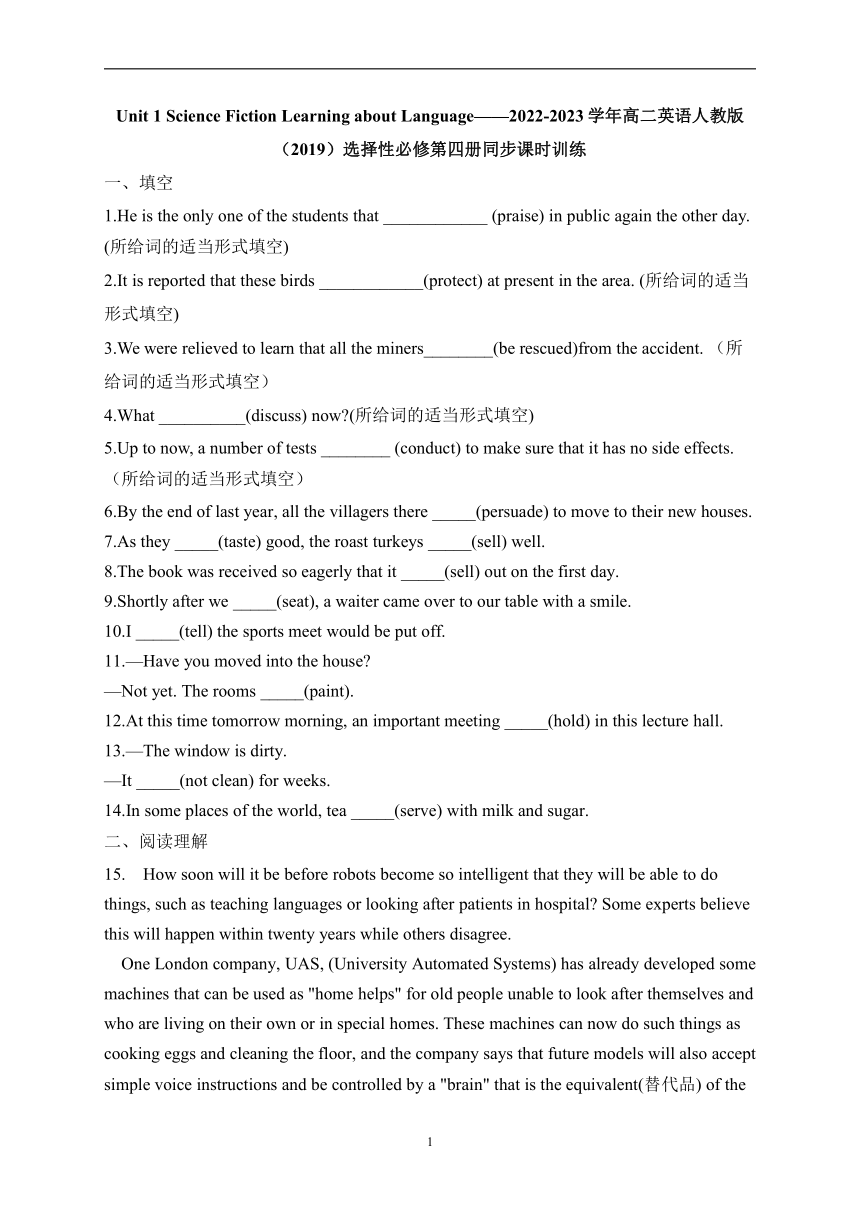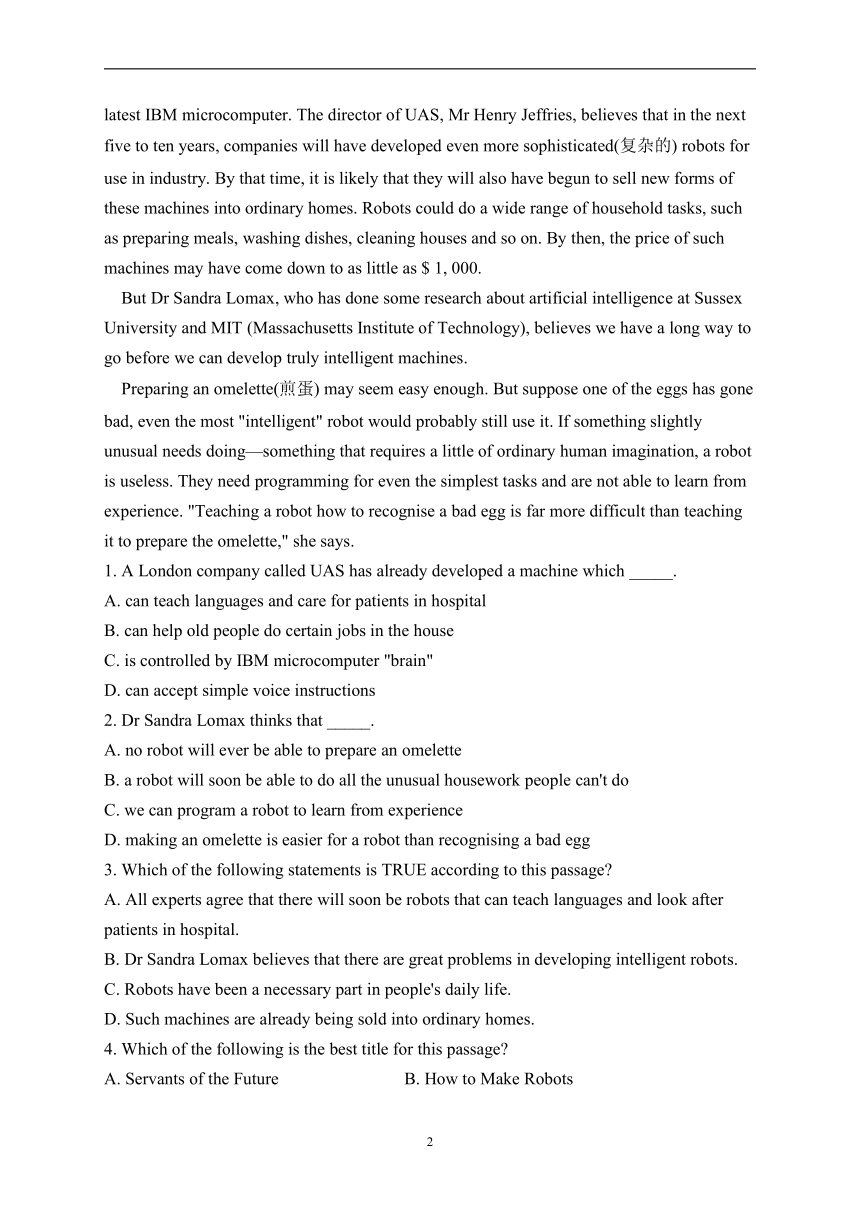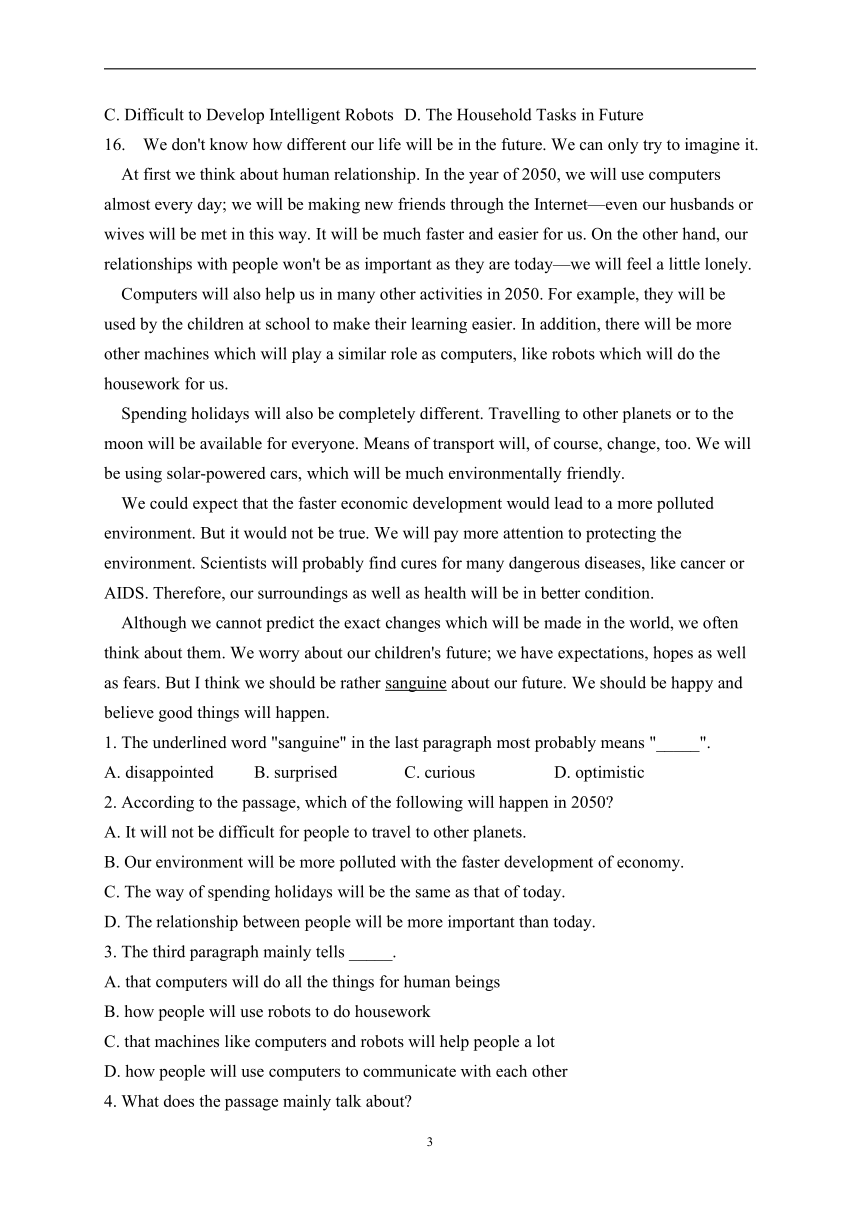人教版(2019)选择性必修 第四册Unit 1 Science Fiction Learning about Language同步课时训练(含答案)
文档属性
| 名称 | 人教版(2019)选择性必修 第四册Unit 1 Science Fiction Learning about Language同步课时训练(含答案) |  | |
| 格式 | docx | ||
| 文件大小 | 22.9KB | ||
| 资源类型 | 教案 | ||
| 版本资源 | 人教版(2019) | ||
| 科目 | 英语 | ||
| 更新时间 | 2023-01-05 19:42:27 | ||
图片预览



文档简介
Unit 1 Science Fiction Learning about Language——2022-2023学年高二英语人教版(2019)选择性必修第四册同步课时训练
一、填空
1.He is the only one of the students that ____________ (praise) in public again the other day. (所给词的适当形式填空)
2.It is reported that these birds ____________(protect) at present in the area. (所给词的适当形式填空)
3.We were relieved to learn that all the miners________(be rescued)from the accident. (所给词的适当形式填空)
4.What __________(discuss) now (所给词的适当形式填空)
5.Up to now, a number of tests ________ (conduct) to make sure that it has no side effects. (所给词的适当形式填空)
6.By the end of last year, all the villagers there _____(persuade) to move to their new houses.
7.As they _____(taste) good, the roast turkeys _____(sell) well.
8.The book was received so eagerly that it _____(sell) out on the first day.
9.Shortly after we _____(seat), a waiter came over to our table with a smile.
10.I _____(tell) the sports meet would be put off.
11.—Have you moved into the house
—Not yet. The rooms _____(paint).
12.At this time tomorrow morning, an important meeting _____(hold) in this lecture hall.
13.—The window is dirty.
—It _____(not clean) for weeks.
14.In some places of the world, tea _____(serve) with milk and sugar.
二、阅读理解
15. How soon will it be before robots become so intelligent that they will be able to do things, such as teaching languages or looking after patients in hospital Some experts believe this will happen within twenty years while others disagree.
One London company, UAS, (University Automated Systems) has already developed some machines that can be used as "home helps" for old people unable to look after themselves and who are living on their own or in special homes. These machines can now do such things as cooking eggs and cleaning the floor, and the company says that future models will also accept simple voice instructions and be controlled by a "brain" that is the equivalent(替代品) of the latest IBM microcomputer. The director of UAS, Mr Henry Jeffries, believes that in the next five to ten years, companies will have developed even more sophisticated(复杂的) robots for use in industry. By that time, it is likely that they will also have begun to sell new forms of these machines into ordinary homes. Robots could do a wide range of household tasks, such as preparing meals, washing dishes, cleaning houses and so on. By then, the price of such machines may have come down to as little as $ 1, 000.
But Dr Sandra Lomax, who has done some research about artificial intelligence at Sussex University and MIT (Massachusetts Institute of Technology), believes we have a long way to go before we can develop truly intelligent machines.
Preparing an omelette(煎蛋) may seem easy enough. But suppose one of the eggs has gone bad, even the most "intelligent" robot would probably still use it. If something slightly unusual needs doing—something that requires a little of ordinary human imagination, a robot is useless. They need programming for even the simplest tasks and are not able to learn from experience. "Teaching a robot how to recognise a bad egg is far more difficult than teaching it to prepare the omelette," she says.
1. A London company called UAS has already developed a machine which _____.
A. can teach languages and care for patients in hospital
B. can help old people do certain jobs in the house
C. is controlled by IBM microcomputer "brain"
D. can accept simple voice instructions
2. Dr Sandra Lomax thinks that _____.
A. no robot will ever be able to prepare an omelette
B. a robot will soon be able to do all the unusual housework people can't do
C. we can program a robot to learn from experience
D. making an omelette is easier for a robot than recognising a bad egg
3. Which of the following statements is TRUE according to this passage
A. All experts agree that there will soon be robots that can teach languages and look after patients in hospital.
B. Dr Sandra Lomax believes that there are great problems in developing intelligent robots.
C. Robots have been a necessary part in people's daily life.
D. Such machines are already being sold into ordinary homes.
4. Which of the following is the best title for this passage
A. Servants of the Future B. How to Make Robots
C. Difficult to Develop Intelligent Robots D. The Household Tasks in Future
16. We don't know how different our life will be in the future. We can only try to imagine it.
At first we think about human relationship. In the year of 2050, we will use computers almost every day; we will be making new friends through the Internet—even our husbands or wives will be met in this way. It will be much faster and easier for us. On the other hand, our relationships with people won't be as important as they are today—we will feel a little lonely.
Computers will also help us in many other activities in 2050. For example, they will be used by the children at school to make their learning easier. In addition, there will be more other machines which will play a similar role as computers, like robots which will do the housework for us.
Spending holidays will also be completely different. Travelling to other planets or to the moon will be available for everyone. Means of transport will, of course, change, too. We will be using solar-powered cars, which will be much environmentally friendly.
We could expect that the faster economic development would lead to a more polluted environment. But it would not be true. We will pay more attention to protecting the environment. Scientists will probably find cures for many dangerous diseases, like cancer or AIDS. Therefore, our surroundings as well as health will be in better condition.
Although we cannot predict the exact changes which will be made in the world, we often think about them. We worry about our children's future; we have expectations, hopes as well as fears. But I think we should be rather sanguine about our future. We should be happy and believe good things will happen.
1. The underlined word "sanguine" in the last paragraph most probably means "_____".
A. disappointed B. surprised C. curious D. optimistic
2. According to the passage, which of the following will happen in 2050
A. It will not be difficult for people to travel to other planets.
B. Our environment will be more polluted with the faster development of economy.
C. The way of spending holidays will be the same as that of today.
D. The relationship between people will be more important than today.
3. The third paragraph mainly tells _____.
A. that computers will do all the things for human beings
B. how people will use robots to do housework
C. that machines like computers and robots will help people a lot
D. how people will use computers to communicate with each other
4. What does the passage mainly talk about
A. What high technology will appear in the year of 2050.
B. What our life will be like in the year of 2050.
C. How people will communicate in the year of 2050.
D. How people will travel and spend their holidays in the year of 2050.
答案以及解析
1.答案:was praised
2.答案:are being protected
3.答案:had been rescued
解析:考查时态和语态,句意:得知所有的矿工都从事故中被救出来,我们都松了一口气。that引导的宾语从句缺乏谓语,根据句意可知,rescue所表示的动词,发生在were relieved to learn之前,所以本句为过去完成时,且从句谓语rescue与从句主语all the miners为被动关系,所以本句为过去完成时的被动语态,故填had been rescued.
4.答案:is being discussed
5.答案:have been conducted
6.答案:had been persuaded
7.答案:taste, sell
8.答案:was sold
9.答案:were seated
10.答案:was told
11.答案:are being painted
12.答案:will be being held
13.答案:hasn't been cleaned
14.答案:is served
15.答案:1-4 BDBC
解析:1.细节理解题。根据第二段前两句可知,UAS公司开发的这种机器人能够帮助老人做一些家务。
2.细节理解题。根据最后一段最后一句可知,对于机器人来说,煎鸡蛋要比识别坏鸡蛋更容易一些。
3.细节理解题。根据第三段的描述可知,桑德拉 洛马克斯博士认为开发出真正的智能机器人还存在着巨大的困难。
4.标题归纳题。本文通过分别描述UAS公司总裁和桑德拉 洛马克斯博士的观点,得出结论——很难开发出真正的智能机器人。
16.答案:1-4 DACB
解析:1.词义猜测题。根据最后一段的最后一句“We should be happy and believe good things will happen.”可知,作者认为我们应该对未来持乐观的心态,相信美好的事情将会发生。故选D项。
2.细节理解题,根据第四段“Spending holidays will also be completely different. Travelling to other planets or to the moon will be available for everyone.”可知,在2050年,旅游度假也将会变得不同,每个人都能前往其他星球旅行。
3.段落大意题。根据“Computers will also help us in many other activities in 2050…In addition, there will be more other machines which will play a similar role as computers,like robots...”可知,第三段讲的是,到2050年,电脑和其他机器,如机器人,将帮助人们做许多事情,故选C项。
4.主旨大意题。根据“We don't know how different our life will be in the future. We can only try to imagine it.”“At first we think about human relationship.”“Computers will also help us in many other activities in 2050.”“Spending holidays will also be completely different.”可知,文章对2050年的日常生活进行了一些大胆的猜想,故选B项。
2
一、填空
1.He is the only one of the students that ____________ (praise) in public again the other day. (所给词的适当形式填空)
2.It is reported that these birds ____________(protect) at present in the area. (所给词的适当形式填空)
3.We were relieved to learn that all the miners________(be rescued)from the accident. (所给词的适当形式填空)
4.What __________(discuss) now (所给词的适当形式填空)
5.Up to now, a number of tests ________ (conduct) to make sure that it has no side effects. (所给词的适当形式填空)
6.By the end of last year, all the villagers there _____(persuade) to move to their new houses.
7.As they _____(taste) good, the roast turkeys _____(sell) well.
8.The book was received so eagerly that it _____(sell) out on the first day.
9.Shortly after we _____(seat), a waiter came over to our table with a smile.
10.I _____(tell) the sports meet would be put off.
11.—Have you moved into the house
—Not yet. The rooms _____(paint).
12.At this time tomorrow morning, an important meeting _____(hold) in this lecture hall.
13.—The window is dirty.
—It _____(not clean) for weeks.
14.In some places of the world, tea _____(serve) with milk and sugar.
二、阅读理解
15. How soon will it be before robots become so intelligent that they will be able to do things, such as teaching languages or looking after patients in hospital Some experts believe this will happen within twenty years while others disagree.
One London company, UAS, (University Automated Systems) has already developed some machines that can be used as "home helps" for old people unable to look after themselves and who are living on their own or in special homes. These machines can now do such things as cooking eggs and cleaning the floor, and the company says that future models will also accept simple voice instructions and be controlled by a "brain" that is the equivalent(替代品) of the latest IBM microcomputer. The director of UAS, Mr Henry Jeffries, believes that in the next five to ten years, companies will have developed even more sophisticated(复杂的) robots for use in industry. By that time, it is likely that they will also have begun to sell new forms of these machines into ordinary homes. Robots could do a wide range of household tasks, such as preparing meals, washing dishes, cleaning houses and so on. By then, the price of such machines may have come down to as little as $ 1, 000.
But Dr Sandra Lomax, who has done some research about artificial intelligence at Sussex University and MIT (Massachusetts Institute of Technology), believes we have a long way to go before we can develop truly intelligent machines.
Preparing an omelette(煎蛋) may seem easy enough. But suppose one of the eggs has gone bad, even the most "intelligent" robot would probably still use it. If something slightly unusual needs doing—something that requires a little of ordinary human imagination, a robot is useless. They need programming for even the simplest tasks and are not able to learn from experience. "Teaching a robot how to recognise a bad egg is far more difficult than teaching it to prepare the omelette," she says.
1. A London company called UAS has already developed a machine which _____.
A. can teach languages and care for patients in hospital
B. can help old people do certain jobs in the house
C. is controlled by IBM microcomputer "brain"
D. can accept simple voice instructions
2. Dr Sandra Lomax thinks that _____.
A. no robot will ever be able to prepare an omelette
B. a robot will soon be able to do all the unusual housework people can't do
C. we can program a robot to learn from experience
D. making an omelette is easier for a robot than recognising a bad egg
3. Which of the following statements is TRUE according to this passage
A. All experts agree that there will soon be robots that can teach languages and look after patients in hospital.
B. Dr Sandra Lomax believes that there are great problems in developing intelligent robots.
C. Robots have been a necessary part in people's daily life.
D. Such machines are already being sold into ordinary homes.
4. Which of the following is the best title for this passage
A. Servants of the Future B. How to Make Robots
C. Difficult to Develop Intelligent Robots D. The Household Tasks in Future
16. We don't know how different our life will be in the future. We can only try to imagine it.
At first we think about human relationship. In the year of 2050, we will use computers almost every day; we will be making new friends through the Internet—even our husbands or wives will be met in this way. It will be much faster and easier for us. On the other hand, our relationships with people won't be as important as they are today—we will feel a little lonely.
Computers will also help us in many other activities in 2050. For example, they will be used by the children at school to make their learning easier. In addition, there will be more other machines which will play a similar role as computers, like robots which will do the housework for us.
Spending holidays will also be completely different. Travelling to other planets or to the moon will be available for everyone. Means of transport will, of course, change, too. We will be using solar-powered cars, which will be much environmentally friendly.
We could expect that the faster economic development would lead to a more polluted environment. But it would not be true. We will pay more attention to protecting the environment. Scientists will probably find cures for many dangerous diseases, like cancer or AIDS. Therefore, our surroundings as well as health will be in better condition.
Although we cannot predict the exact changes which will be made in the world, we often think about them. We worry about our children's future; we have expectations, hopes as well as fears. But I think we should be rather sanguine about our future. We should be happy and believe good things will happen.
1. The underlined word "sanguine" in the last paragraph most probably means "_____".
A. disappointed B. surprised C. curious D. optimistic
2. According to the passage, which of the following will happen in 2050
A. It will not be difficult for people to travel to other planets.
B. Our environment will be more polluted with the faster development of economy.
C. The way of spending holidays will be the same as that of today.
D. The relationship between people will be more important than today.
3. The third paragraph mainly tells _____.
A. that computers will do all the things for human beings
B. how people will use robots to do housework
C. that machines like computers and robots will help people a lot
D. how people will use computers to communicate with each other
4. What does the passage mainly talk about
A. What high technology will appear in the year of 2050.
B. What our life will be like in the year of 2050.
C. How people will communicate in the year of 2050.
D. How people will travel and spend their holidays in the year of 2050.
答案以及解析
1.答案:was praised
2.答案:are being protected
3.答案:had been rescued
解析:考查时态和语态,句意:得知所有的矿工都从事故中被救出来,我们都松了一口气。that引导的宾语从句缺乏谓语,根据句意可知,rescue所表示的动词,发生在were relieved to learn之前,所以本句为过去完成时,且从句谓语rescue与从句主语all the miners为被动关系,所以本句为过去完成时的被动语态,故填had been rescued.
4.答案:is being discussed
5.答案:have been conducted
6.答案:had been persuaded
7.答案:taste, sell
8.答案:was sold
9.答案:were seated
10.答案:was told
11.答案:are being painted
12.答案:will be being held
13.答案:hasn't been cleaned
14.答案:is served
15.答案:1-4 BDBC
解析:1.细节理解题。根据第二段前两句可知,UAS公司开发的这种机器人能够帮助老人做一些家务。
2.细节理解题。根据最后一段最后一句可知,对于机器人来说,煎鸡蛋要比识别坏鸡蛋更容易一些。
3.细节理解题。根据第三段的描述可知,桑德拉 洛马克斯博士认为开发出真正的智能机器人还存在着巨大的困难。
4.标题归纳题。本文通过分别描述UAS公司总裁和桑德拉 洛马克斯博士的观点,得出结论——很难开发出真正的智能机器人。
16.答案:1-4 DACB
解析:1.词义猜测题。根据最后一段的最后一句“We should be happy and believe good things will happen.”可知,作者认为我们应该对未来持乐观的心态,相信美好的事情将会发生。故选D项。
2.细节理解题,根据第四段“Spending holidays will also be completely different. Travelling to other planets or to the moon will be available for everyone.”可知,在2050年,旅游度假也将会变得不同,每个人都能前往其他星球旅行。
3.段落大意题。根据“Computers will also help us in many other activities in 2050…In addition, there will be more other machines which will play a similar role as computers,like robots...”可知,第三段讲的是,到2050年,电脑和其他机器,如机器人,将帮助人们做许多事情,故选C项。
4.主旨大意题。根据“We don't know how different our life will be in the future. We can only try to imagine it.”“At first we think about human relationship.”“Computers will also help us in many other activities in 2050.”“Spending holidays will also be completely different.”可知,文章对2050年的日常生活进行了一些大胆的猜想,故选B项。
2
